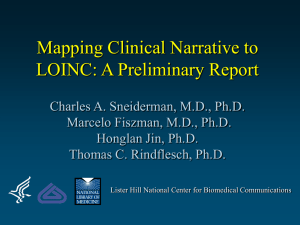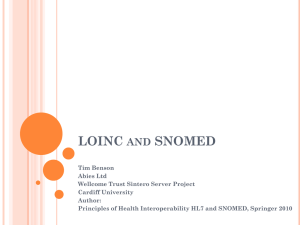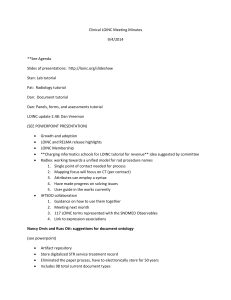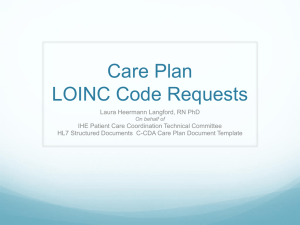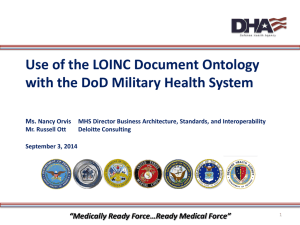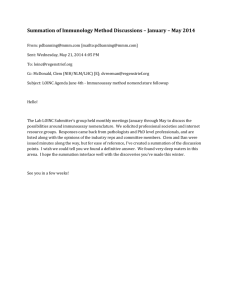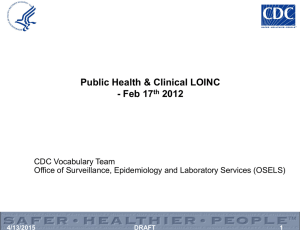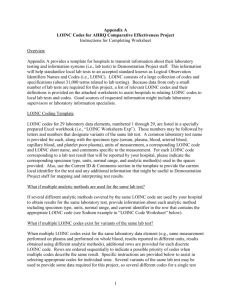Handout - Intro to RCMT
advertisement
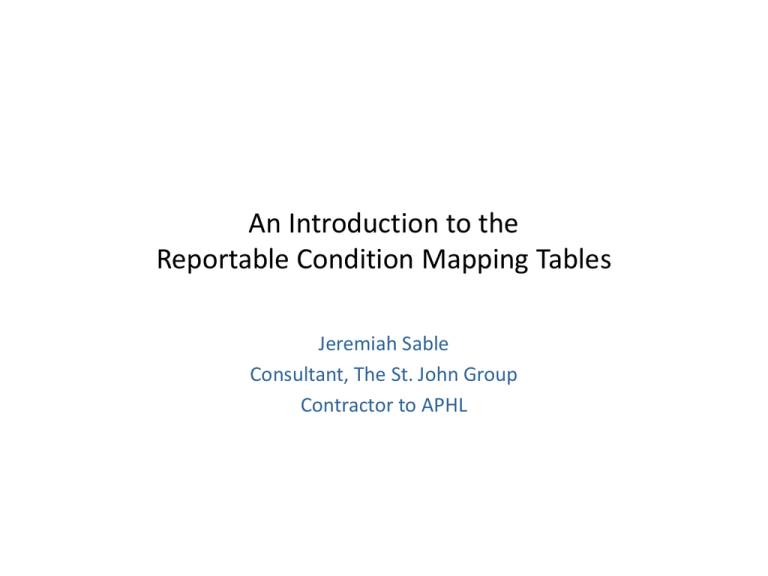
An Introduction to the Reportable Condition Mapping Tables Jeremiah Sable Consultant, The St. John Group Contractor to APHL What problem do the RCMTs solve? Clinical Lab Test results Consumer of lab data Which test results are of public health interest in which jurisdiction? Filtering the output of clinical labs Clinical Lab Test results RCMT filter Reportable Non reportable Consumer of lab data RCMT tables can identify tests and results of public health interest. Within a public health agency Public health agency TB Test results STD RCMT Foodborne Hepatitis etc. Routing test results within an agency The problem of non-comparable lab data ARUP labs LabCorp Mayo labs Each lab has its own codes and names for lab tests. There is no consistency across labs. Quest labs etc.... It isn’t possible to map the test catalog of each lab to reportable conditions. LOINC enables data aggregation across labs ARUP labs LOINC LabCorp LOINC Mayo labs LOINC Quest labs LOINC etc.... LOINC This problem disappears when labs send LOINC codes along with their own codes. It is possible to map LOINC tests to reportable conditions. RCMTs map LOINC tests to reportable conditions LOINC code LOINC test name Condition 5672-1 Lead : MCnc : Pt : Bld : Ord : Lead poisoning 38462-8 Legionella sp Ag : ACnc : Pt : Sputum : Ord : IF Legionellosis 17324-5 Neisseria meningitidis Ag : ACnc : Pt : CSF : Qn : LA Meningococcal disease 31955-8 Rubella virus Ag : ACnc : Pt : CSF : Ord : Rubella 33688-3 Yersinia pestis Ag : ACnc : Pt : Isolate : Ord : IF Plague Simplified example of RCMT content Does this LOINC map to a reportable condition? LOINC code LOINC test name Condition 5883-4 ??? Virus identified : Prid : Pt : Bld : Nom : Culture Many LOINCs are non-specific and cannot be mapped to conditions. Does this LOINC map to a reportable condition? LOINC code LOINC test name Condition 5883-4 ??? Virus identified : Prid : Pt : Bld : Nom : Culture Many LOINCs are non-specific and cannot be mapped to conditions. For these non-specific LOINCs the RCMTs contain lists of organisms that cause reportable conditions. These lists contain SNOMED organism codes and names. Current work 1. Documentation Document existing RCMT processes 2. SDO updates • LOINC and SNOMED processes, including downloading, browsing, searching, etc. 3. Collaboration • Getting LOINC and SNOMED data into locally maintained spreadsheets and databases • Finding information online: taxonomy web sites, clinical information, commercial lab sites, microbiology text books, etc. • Administrative activities Current work 1. Documentation 2. SDO updates 3. Collaboration New SNOMED releases occur every six months • Update RCMTs with July 31 release of SNOMED • Develop and document processes for reviewing changes in SNOMED and updating RCMT content • Iterative improvement of SNOMED processes LOINC is released three to four times per year • Update RCMTs with LOINC version 2.35 • Develop and document processes for reviewing changes in LOINC and updating RCMT content • Iterative improvement of LOINC processes Current work 1. Documentation The RCMT project overlaps the work of some current and planned projects. 2. SDO updates 3. Collaboration Mechanisms for communication and collaboration between RCMT and these other projects will be necessary to avoid duplicated efforts and inconsistent recommendations. RCMT contact information RCMT Planning Team E-mail: PHINVS@CDC.GOV RCMT Website (phConnect) : http://www.phconnect.org/group/rcmt

